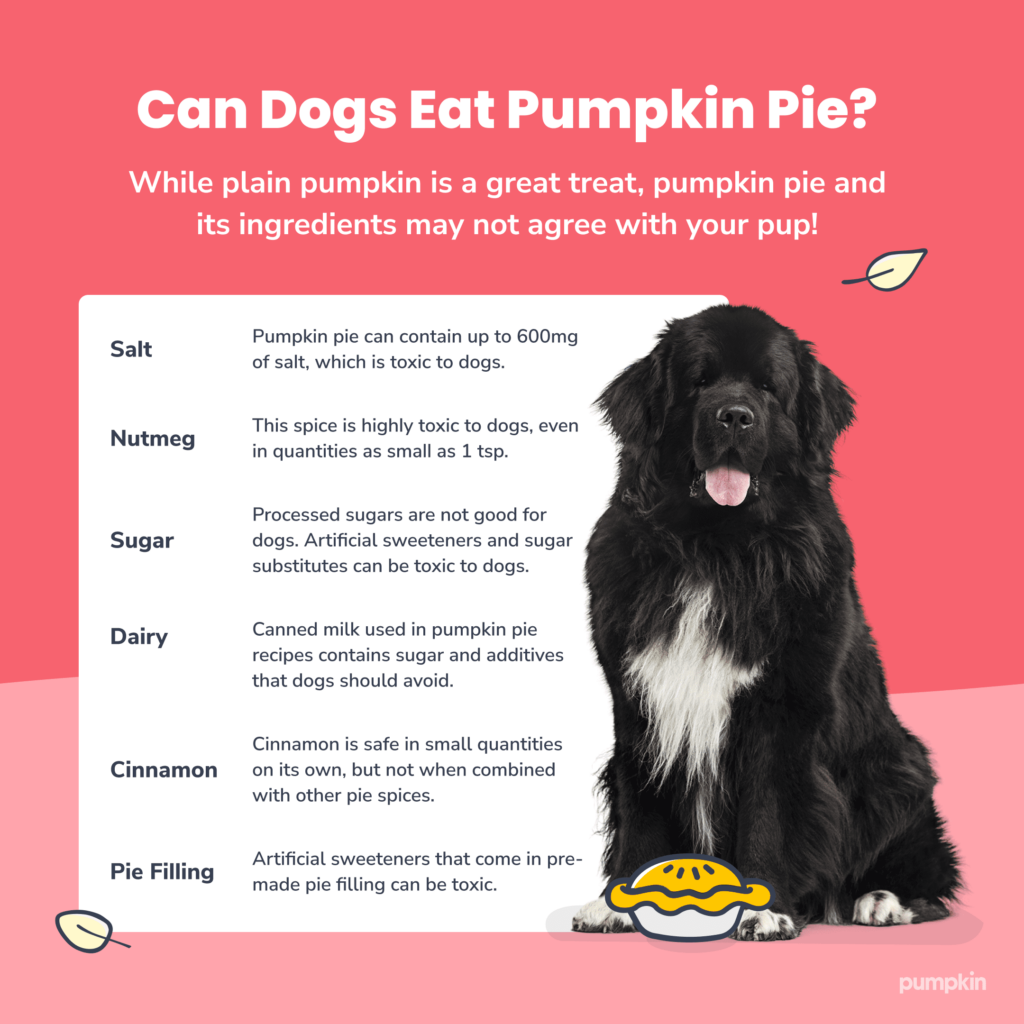Key Points:
- No, dogs cannot eat pumpkin pie due to the toxicity of seasonings like nutmeg and high sugar content.
- Most pumpkin pies contain nutmeg, which is a potential neurotoxin for dogs.
- If ingested, monitor your dog for signs of upset stomach or other distress.
As your dog waits on the dinner table sidelines for morsels of holiday goodness, you may be wondering: can dogs eat pumpkin pie?
While pumpkin by itself is a healthy treat for dogs, the same can’t be said about pumpkin pie. Although a small spoonful of pie likely won’t harm your dog, you should avoid intentionally feeding it to them.
Let’s dive into why you should avoid this human food and pumpkin alternatives that will keep your dog safe.
What makes pumpkin pie bad for dogs?
The ingredients that make pumpkin pie delicious are usually the same ingredients that spell trouble for our dogs. The following additions to your pumpkin pie recipe may be toxic for your pup:

Pumpkin pie filling
Some canned pumpkin pie fillings include spices, sugars, preservatives, and artificial sweeteners. Artificial sweeteners, especially xylitol, can be extremely toxic for your dog. Another preservative sometimes found in pumpkin pie filling – potassium metabisulfite – can cause an allergic reaction in some dogs, with a large exposure affecting your dog’s nervous and circulatory systems.
The pie crust
We make our flaky pie crusts with butter and oils to bind the flour and make it flaky. These oils can overwhelm your dog’s digestive system. If they ingest enough, your dog could end up with a severe upset stomach or even pancreatitis.
Salt
Canned pumpkin with no additional ingredients contains 12 mg of salt. However, pumpkin pie mix can contain up to 600 mg of salt, leaving your dog at risk for salt toxicity or poisoning.
Dairy
Pumpkin pie contains milk or cream, sometimes in the form of canned milk. Canned milk can have additives and preservatives, as well as sugars, so it’s best to avoid it. Plus, many dogs are lactose intolerant, which means drinking milk of any kind will cause them to suffer from abdominal pain, diarrhea, or constipation.
Whipped cream
While ordering a Puppuccino at the drive-thru window every once in a while is fine, the fats and sugars in whipped cream can cause tummy troubles for your dog.
Processed sugars
Processed sugars are never a good idea for your dog’s digestive system and offer more problems than health benefits!
Raw eggs
While cooked eggs are fine for your dog to eat in moderation, raw eggs present a salmonella risk. If you’re baking pumpkin pie
Spices
Pumpkin spice typically includes cinnamon, ginger, nutmeg, cloves and allspice. While delicious for us, these spices could cause some serious health problems for your dog. Here’s a rundown of the risks that typical pumpkin pie spices present to your dog.
Cinnamon: Depending on the dose your dog ingests, cinnamon may cause no health problems and even have some benefits. However, too much can be toxic – it can lead to low blood sugar, liver disease, vomiting, diarrhea, and heart rate instability. It can also irritate the skin in your dog’s mouth.
Cloves and Allspice: Dogs can have cloves in small quantities. The amount called for in most recipes won’t be toxic for your dog. (Cats, though, can have adverse reactions to clove oil, which contains eugenol, an aromatic enzyme that can cause liver toxicity in cats.)
Ginger: This spice is generally fine for dogs. The amount of ginger used in most recipes won’t be toxic for your dog. However, if they eat a lot of dried ginger, it can irritate their mouth.
Nutmeg: This is the #1 spice to avoid and is found in most pumpkin pie recipes. Nutmeg is toxic for dogs – it contains myristicin, found in the nut’s oil. Nutmeg is toxic in quantities as small as 5 grams, with small dogs needing even less to cause symptoms.
Nutmeg toxicity can last up to 48 hours after ingestion, with symptoms including:
- Hallucinations
- Disorientation
- Increase in heart rate
- High blood pressure
- Dry mouth
- Abdominal pain
- Seizures
If you suspect your dog has nutmeg poisoning – or eaten a whole pumpkin pie – seek veterinary care immediately or call the Pet Poison Helpline.
Pet Pro Tip: If you have a dog that is prone to ‘snacksidents’ – you should consider getting a dog insurance plan as soon as possible. It can help you afford the best care in the future by covering eligible vet bills for digestive illnesses, toxic ingestion, and more.
Health benefits of plain pumpkin
Plain pumpkin can be a great addition to your dog’s diet. It’s loaded with the following antioxidants, vitamins, minerals, and a healthy dose of dietary fiber:
Vitamin A: This vitamin aids in eye and brain development.
Vitamin C, Vitamin E: These antioxidants protect against free radicals that can damage cells through oxidation. They also boost your dog’s immune system, protect their bodies from some cancers, and reduce inflammation, as well as protecting their brains from the effects of cognitive aging.
Potassium: This helps your dog digest and process nutrients. It’s an electrolyte that strengthens the electrical charges of their heart, nerves, and muscles.
Beta Carotene: This is a form of vitamin A that supports eye health.
Dietary fiber: Fiber regulates the digestive system by pushing food and waste through the body smoothly. It can also help overweight dogs feel full for longer after meals. The high fiber content of pumpkin can help treat both diarrhea and constipation!
Prebiotics: Prebiotic properties found in pumpkin regulate the growth of good bacteria in your dog’s intestines and inhibit the growth of bad bacteria that can cause intestinal upset.
Tip: Well-balanced dog food should make up 90% of your dog’s daily calories. Treats, like that accidental spoonful of pumpkin pie, piece of turkey, or roasted vegetable, around the holidays can make up the remaining 10% of their diet.
The last word on pumpkin pie and your dog
While dogs can eat a spoonful of pumpkin pie and come out unscathed, it doesn’t mean they should. Raw pumpkin is a far healthier treat – as are sweet potatoes and the commercial pumpkin dog treats you find at local pet stores.
FAQs
What if my dog ate pumpkin pie?
If your dog ate pumpkin pie, it may not be an immediate cause for concern. A small bite of pumpkin pie can be harmless — especially if you have a larger dog. However, regardless of how much they munched on, it’s important to monitor for any stomach issues or pain. If your dog ate a large quantity of pie, though, make sure to call your vet for advice. If a lot of nutmeg has been consumed, it can be toxic to your pup.
Why is pumpkin great for dogs, but pumpkin pie isn’t?
Plain pumpkin is a healthy treat for your furry friend as it’s loaded with antioxidants, vitamins, and minerals. Pumpkin pie on the other hand, is loaded with additional ingredients like highly processed sugar content and nutmeg which is toxic to dogs. These ingredients can cause upset stomachs, digestive issues, and contribute to weight gain.
How much pumpkin pie can my dog eat before it’s an issue?
We certainly don’t want to tell dog owners to feed their dog a slice of pumpkin pie, because that can cause bad stomach issues, especially for smaller dog breeds. A bite or two likely won’t cause issues, but again, we don’t advise on intentionally feeding your dog this treat.




